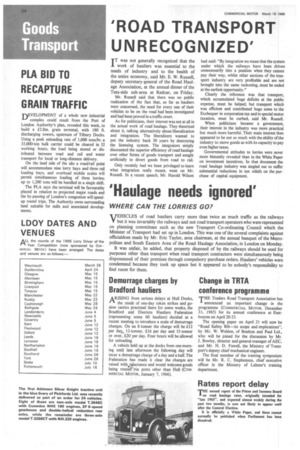'ROAD TRANSPORT UNRECOGNIZED'
Page 36

If you've noticed an error in this article please click here to report it so we can fix it.
IT was not generally recognized that the work of hauliers was essential to the needs of industry and to the health of the entire economy, said Mr. E. W. Russell, deputy secretary-general of the Road Haulage Association, at the annual dinner of the Tees-side sub-area at Redcar, on Friday.
Mr. Russell said that there was no public realization of the fact that, so far as hauliers were concerned, the need for every one of their vehicles to be on the road had been investigated and had been proved in a traffic court.
As for politicians, their interest was not at all in the actual work of road haulage. They theorized about it, talking alternatively about liberalization and integration. The liberalizers wanted to put the industry back 30 years by destroying the licensing system. The integrators simply discounted the superior efficiency of road haulage over other forms of goods transport and sought artificially to divert goods from road to rail.
Only recently had we been privileged to learn what integration really meant, went on Mr. Russell. In a recent speech, Mr. Harold Wilson had said: "By integration we mean that the system under which the railways have been driven unnecessarily into a position when they cannot pay their way, whilst other sections of the transport industry are very profitable and are not brought into the same reckoning, must be ended at the earliest opportunity."
Clearly the inference was that transport, which accumulated huge deficits at the public expense, must be helped; but transport which was efficient and contributed huge sums to the Exchequer in corporation tax and in special motor taxation, must be curbed, said Mr. Russell.
When politicians became a government, their interest in the industry was more practical but much more harmful. Their main interest then appeared to be not so much with the ability of the industry to move goods as with its capacity to pay even higher taxes.
Governmental attitudes to lorries were never more blatantly revealed than in the White Paper on investment incentives. In that document the road haulage industry was singled out to suffer substantial reductions in tax reliefs on the purchase of capital equipment.




































































































































































